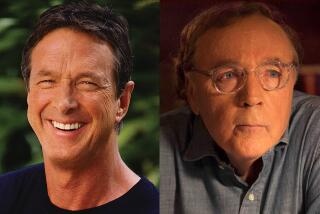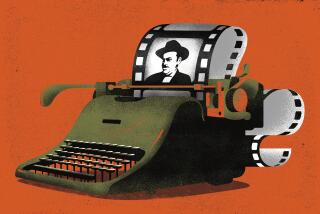The Two Mikes
I’m not surprised director Philip Kaufman made some ethnicity changes when he turned Michael Crichton’s “Rising Sun” into a movie (“When Simple Isn’t Good Enough,” by Gene Seymour, July 25). He’s nothing if not politically correct.
Look what he did to “The Right Stuff.” He couldn’t find any black faces in Tom Wolfe’s book, but he found some in Australia. Remember the old aborigine who sent the little “gadgets” up to a bedazzled orbiting John Glenn? And how about the Anthony Munoz-Scott Glenn relationship--that was a transparent and unnecessary attempt to balance Bill Dana’s Jose Jimenez routine. Kaufman just couldn’t trust the moviegoer to look at the old “Ed Sullivan Show” clip in its period context.
For some reason, Kaufman thinks his movies are important enough in the grand scheme of things that he has to try to please everybody, like he’s making national policy or something. Michael Crichton had no such compulsion when he wrote the book. Yet it’s no less of a book, nor should Crichton have any trouble getting into heaven.
Political correctness is fine if you can slip it in unnoticed, but too often it’s so obvious that it distracts from the story. Suddenly you find yourself unabsorbed and thinking about why the filmmaker did this or that, and in the end, noble intentions turn to lousy filmmaking.
STEVE FOSTER
Los Angeles
*
Couldn’t help but detect a note of bias in your Phil Kaufman piece. In detailing the conflict over “Rising Sun,” Michael Crichton is labeled “the author of mass-market literary successes,” while Kaufman is heralded as “the hip, daring auteur of (such) quirky critical favorites.”
Crichton is a great deal more than just an author, having been a doctor, a director, a screenwriter and a journalist. If Kaufman is “hip” for making pretentious, self-indulgent films, fine. But how does one get labeled “daring” for watering down the year’s most controversial novel?
PAT JANKIEWICZ
Upland
*
Regarding “Memo to Would-Be Screenwriters: Get to Know Crichton,” by Jane Galbraith (Film Clips, July 25):
While it was nice to see the contributions of Michael Backes to the silver screen finally acknowledged, I’ve no doubt he, like myself, was somewhat aghast at how your reporter credited “The Stars My Destination” to both Alfred Bester and Howard Chaykin.
I know mistakes of this sort are unavoidable, but this one is like confusing the artist of the Classics Illustrated version of “Moby Dick” with Herman Melville.
The version you refer to is a “graphic novel,” or comic book adaptation, by Chaykin--the only version of Bester’s classic 1957 story now in print. Chaykin is a talented graphic artist who adapted Bester’s novel for comics in 1979, although it wasn’t published in complete form until last year.
Bester, who died in 1987, was a prolific author perpetually ahead of his time. Readers, given a taste of his writing, are quick to add their names to long waiting lists in the hope of obtaining used copies of his books. Let’s hope that Hollywood’s marked interest in his work will persuade publishers to bring it back into print.
ARTHUR BYRON COVER
Dangerous Visions Bookstore
Sherman Oaks
More to Read
Only good movies
Get the Indie Focus newsletter, Mark Olsen's weekly guide to the world of cinema.
You may occasionally receive promotional content from the Los Angeles Times.










